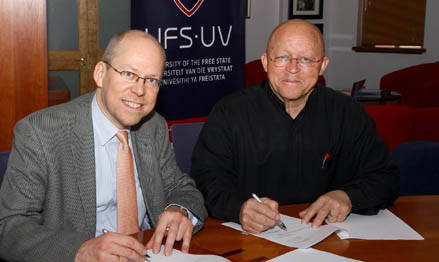Latest News Archive
Please select Category, Year, and then Month to display items
12 October 2020
|
Story Arina Engelbrecht
|
Photo Supplied
 Arina Engelbrecht from Organisational Development and Employee Well-being believes physical activity has a number of benefits for one’s health, including stress relief.
Arina Engelbrecht from Organisational Development and Employee Well-being believes physical activity has a number of benefits for one’s health, including stress relief.
Being physically active plays a big role in preventing the development of mental-health problems and in improving the quality of life of people experiencing mental-health problems.
Treatment for depression
Physical activity can be an alternative treatment for depression. It can be used as a stand-alone treatment or in combination with medication and/or psychological therapy. It promotes all kinds of changes in the brain, including neural growth, reduced inflammation, and new activity patterns are formed that promote feelings of calm and well-being. It releases endorphins – powerful chemicals in the brain that energise your spirit and make you feel good.
Physical activity can be very effective in relieving stress. Research in adults has found that physically active individuals tend to have lower stress levels compared to individuals who are less active. It also leads to improved sleep. When a person sleeps better and feels more rested, overall quality of life improves. They cope better with daily life stressors.
Reduce Alzheimer's risk
Regular physical activity can reduce your risk of developing Alzheimer's disease by up to 50%. It can also slow down further deterioration in those who have already started to develop cognitive problems. It stimulates the brain’s ability to maintain old connections as well as to make new ones.
A study asked people to rate their mood immediately after periods of physical activity (e.g. going for a walk/run, cycling, doing housework) and periods of inactivity (e.g. reading a book or watching television). Researchers found that participants felt more content, more awake, and calmer after being physically active compared to after periods of inactivity.
In conclusion, people who are physically active feel a sense of well-being, feel more energetic throughout the day, sleep better at night, have sharper memories, and feel more relaxed and positive about themselves and their lives.
“Being physically active not only changes your body, it changes your mind,
attitude, and your mood.” – Arina Engelbrecht
Strengthening ties with Belgium ally
2013-10-31
|
 |
From the left are: Prof Dr Johan Meeusen signing the agreement with Prof Nicky Morgan, Vice-Rector: Operations.
Photo: Hannes Pieterse
31 October 2013 |
The UFS signed a formal agreement with the University of Antwerp, strengthening the two institutions’ existing collaboration. Prof Dr Johan Meeusen, Vice-Rector and Professor of European Law and Private International Law at the University of Antwerp, visited the Bloemfontein Campus to sign the agreement. This arrangement will ensure that the two institutions work in close conjunction on research and additional projects.
Dineo Gaofhiwe-Ingram, Assistant Director: Internationalisation, says the new relationship between the two universities will have a strong research focus. "It’s evident and known that we want to become a research-intensive university.” She emphasises that the relationship with Antwerp as well as partnerships with a variety of other institutions are crucial. These will ensure that young emerging scholars, like those taking part in the Vice-Chancellor's Prestige Scholars Programme, are exposed internationally during their development. “We hope that some of the scholars in the new cohort of the PSP will be able to find scientists to host them at Antwerp," Gaofhiwe-Ingram adds.
In addition, she explains that this formal agreement will augment pre-existing collaborations with the Unit for Language Facilitation and Empowerment, as well as the Centre for Health Systems Research and Development. It will also open up cooperation between other faculties and disciplines. “Through Eurosa/Erasmus Mundus Project, which awards scholarships to South African students and staff to study in Europe, the 2014 project will now also award scholarships to European students and staff to come and study in South Africa,” Gaofhiwe-Ingram announced.
The University of Antwerp is one of the European associates that participates in the Leadership for Change Programme and hosted a group of first-year Kovsie students during 2011. In 2012, representatives from the University of Antwerp attended the Leadership Summit presented on the Bloemfontein Campus. Another group of first-year students from the UFS took part in this year’s programme.